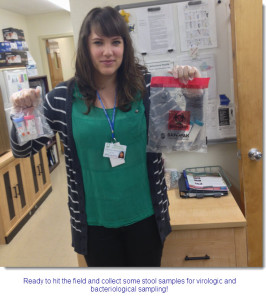Public health folks, especially those in the local health departments, have the best stories. They see food safety risks (and risk reduction) in action weekly either through routine inspection visits or outbreak investigations. Sharing outbreak investigation stories – from the consequences, to stool sampling, to investigation of practices – provides a foundation for others to learn from.
Caroline Stamatakis, a CDC fellow, writes about the details of a December 2014 Salmonella Thompson outbreak for the Council of State and Territorial Epidemiologists blog.
Highlights include:
To identify potential sources of illness, we performed a case control study. Additionally, we collected stool samples from 12 persons who became ill. These were assessed by the Georgia Public Health Laboratory (GPHL). Staff from the Environmental Health Services Unit of FCDHW interviewed the individual who prepared the main meat entrees (pork and chicken) regarding the handling, cooking, and serving procedures used.
Models using exact logistic regression indicate that only the smoked chicken was significantly associated with illness. GPHL bacteriology results identified 10 positive specimens for Salmonella Thompson. Pulsed-field gel electrophoresis (PFGE) indicated that nine of the 10 specimens had the same pattern. Findings from Environmental Health Service interviews revealed that the person preparing the chicken had limited knowledge regarding the required temperatures and procedures necessary to properly store or cook chicken for such a large number of people.
The epidemiologic, clinical, and environmental data collected indicate a point source outbreak due to contaminated smoked chicken as the probable transmission vehicle. The presence of two PFGE patterns in an outbreak such as this is not commonly reported in epidemiology literature – but it does occur.
These findings indicate that proper food preparation and serving processes, such as temperature regulation, are highly important in the prevention of foodborne outbreaks. Furthermore, private entities that do not have permits for food service and catering events are not held to the same hygiene and food safety standards as professional caterers.
